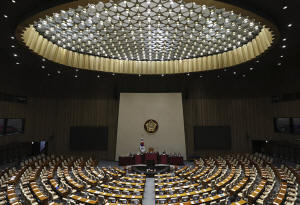South Korean lawmakers are deciding whether to impeach the president
over his martial law bid
 Send a link to a friend
Send a link to a friend
 [December 07, 2024]
By KIM TONG-HYUNG and HYUNG-JIN KIM [December 07, 2024]
By KIM TONG-HYUNG and HYUNG-JIN KIM
SEOUL, South Korea (AP) — South Korean lawmakers on Saturday began
meeting to vote on whether to impeach President Yoon Suk Yeol over his
short-lived attempt to impose martial law, as protests grew nationwide
calling for his removal.
They gathered in the National Assembly hours after Yoon issued a public
apology over the move, saying he won’t shirk legal or political
responsibility for the declaration and promising not to make another
attempt to impose martial law.
In a brief televised address, Yoon said he would leave it to his party
to chart a course through the country's political turmoil, “including
matters related to my term in office."
“The declaration of this martial law was made out of my desperation. But
in the course of its implementation, it caused anxiety and
inconveniences to the public. I feel very sorry over that and truly
apologize to the people who must have been shocked a lot,” Yoon said.
Since taking office in 2022, Yoon, a conservative, has struggled to push
his agenda through an opposition-controlled parliament and grappled with
low approval ratings amid scandals involving himself and his wife. In
his martial law announcement on Tuesday night, Yoon called parliament a
“den of criminals” bogging down state affairs and vowed to eliminate
“shameless North Korea followers and anti-state forces.”
It isn't immediately clear whether the motion to impeach Yoon will get
the two-thirds support needed to pass. The opposition parties that
jointly brought the impeachment motion control 192 of the legislature's
300 seats, meaning they need at least eight additional votes from Yoon's
People Power Party.
That appeared more likely after the chair of Yoon's party called for his
removal on Friday, but the party remained formally opposed to
impeachment.

Lawmakers on Saturday first voted on a bill appointing a special
prosecutor to investigate stock price manipulation allegations
surrounding Yoon’s wife. Some lawmakers from Yoon’s party were seen
leaving the hall after that vote, triggering angry shouts from
opposition lawmakers.
If Yoon is impeached, his powers will be suspended until the
Constitutional Court decides whether to remove him from office. If he is
removed, an election to replace him must take place within 60 days.
The turmoil resulting from Yoon’s bizarre and poorly-thought-out stunt
has paralyzed South Korean politics and sparked alarm among key
diplomatic partners, including neighboring Japan and Seoul’s top ally
the United States, as one of the strongest democracies in Asia faces a
political crisis that could unseat its leader.
Tuesday night saw special forces troops encircling the parliament
building and army helicopters hovering over it, but the military
withdrew after the National Assembly unanimously voted to overturn the
decree, forcing Yoon to lift it before daybreak Wednesday. The
declaration of martial law was the first of its kind in more than 40
years in South Korea.
Seemingly tens of thousands of people packed streets near the National
Assembly, waving banners, shouting slogans and dancing and singing along
to K-pop songs with lyrics changed to call for Yoon’s ouster. The
protests were growing Saturday afternoon, with subway trains not
stopping at the stations near the Assembly because of the sudden
increase in crowds.

[to top of second column]
|

A view of the hall where the plenary session for the impeachment
vote of South Korean President Yoon Suk Yeol is set to take place at
the National Assembly in Seoul, South Korea, Saturday, Dec. 7, 2024.
(Jeon Heon-kyun/Pool Photo via AP)

A smaller crowd of Yoon’s supporters, which still seemed to be in
the thousands, rallied in separate streets in Seoul, decrying the
impeachment attempt they saw as unconstitutional.
Opposition lawmakers say that Yoon’s attempt at martial law amounted
to a self-coup, and drafted the impeachment motion around rebellion
charges.
Lee Jae-myung, the leader of the main liberal opposition Democratic
Party, told reporters that Yoon’s speech was “greatly disappointing”
and that the only way forward is his immediate resignation or
impeachment.
It's not clear if members of Yoon's PPP will break ranks to vote for
impeachment. Eighteen lawmakers from a minority faction of the party
joined the unanimous vote to cancel martial law, which passed 190-0.
However, the party has decided to oppose the impeachment.
Experts say the PPP fears Yoon's impeachment and possible removal
from office would leave the conservatives in disarray and easily
losing a presidential by-election to liberals.
On Friday, PPP chair Han Dong-hun, who also heads the minority
faction that helped cancel martial law, called for suspending Yoon’s
constitutional powers, describing him as unfit to hold the office
and capable of taking more extreme actions. But Han is not a
lawmaker and the party's position remains anti-impeachment.
Han said he had received intelligence that during the brief period
of martial law Yoon ordered the country’s defense
counterintelligence commander to arrest and detain unspecified key
politicians based on accusations of “anti-state activities."
Following Yoon’s televised address, Han reiterated his call for him
to step down, saying that the president wasn’t in a state where he
could normally carry out official duties. “President Yoon Suk Yeol’s
early resignation is inevitable,” Han told reporters.
Hong Jang-won, first deputy director of South Korea’s National
Intelligence Service, later told lawmakers in a closed-door briefing
that Yoon called after imposing martial law and ordered him to help
the defense counterintelligence unit to detain key politicians. The
targeted politicians included Han, Lee and National Assembly speaker
Woo Won Shik, according to Kim Byung-kee, one of the lawmakers who
attended the meeting.

The Defense Ministry said it had suspended the defense
counterintelligence commander, Yeo In-hyung, who Han alleged had
received orders from Yoon to detain the politicians. The ministry
also suspended the commanders of the capital defense command and the
special warfare command over their involvement in enforcing martial
law.
Former Defense Minister Kim Yong Hyun, who has been accused of
recommending Yoon enforce martial law, has been placed under a
travel ban and faces an investigation by prosecutors over rebellion
charges.
Vice Defense Minister Kim Seon Ho has testified to parliament that
it was Kim Yong Hyun who ordered troops to be deployed to the
National Assembly after Yoon imposed martial law.
All contents © copyright 2024 Associated Press. All rights reserved |